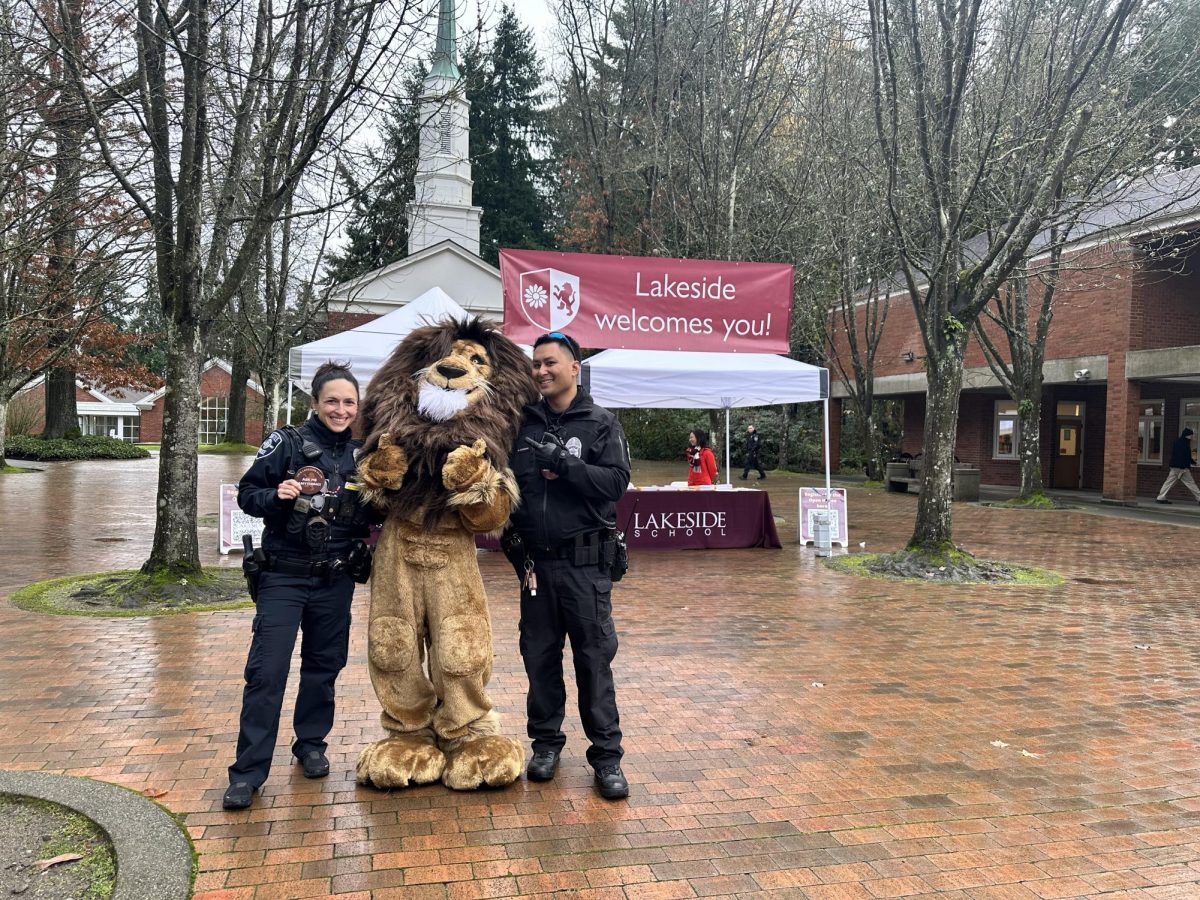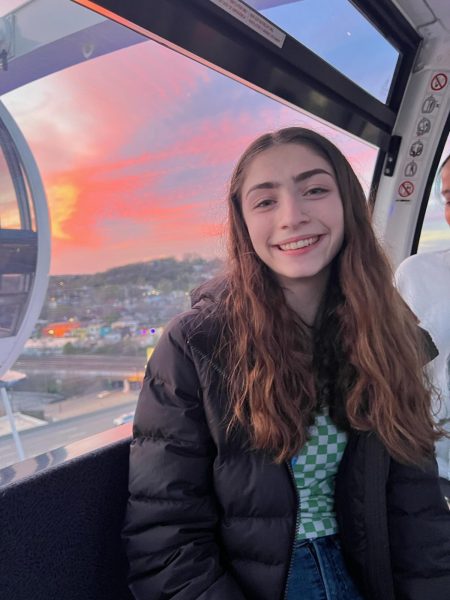Standing amongst the crowd at Lakeside’s most recent commencement were two officers, dressed in Seattle Police uniforms. Though they stood around the perimeter of the ceremony, these officers were by no means unfamiliar with Lakeside: Almost two decades ago, they themselves had walked across the stage in front of Bliss Hall.
The officers are Lauren Balter ’07 and Coco Daranciang ’06. Last year, the pair began working private security jobs for Lakeside — including patrolling sports games and large social events like the admissions department’s open house.
David Buerger, Director of Community Safety, explained that, for a number of years, Lakeside contracted with a private agency to find police officers, but is now focusing on hiring officers like Balter and Daranciang who are familiar with Lakeside.
Mr. Buerger wrote that Balter and Daranciang are integral to campus safety because they provide “quick access to emergency intervention and de-escalation,” ensuring the school is not affected by delayed response times caused by SPD short-staffing. He also described Balter and Daranciang as a “positive presence on campus,” noting how both officers wore alumni badges at the open house, fielding questions from prospective families, and even took a picture with several new graduates following the commencement ceremony.
Each grad followed a unique path to the Seattle Police Department.
Daranciang, a Lakeside “lifer” who started at the school in 5th grade, graduated in 2006 and then attended UW Honors Program, earning degrees in biology and biochemistry. He worked in a lab for a year doing clinical cancer research before realizing it wasn’t what he wanted to do with his life.
“I just kind of decided that it wasn’t really for me,” he said. “I needed something a little more hands on, a little more out there.”
In 2012, Daranciang applied for a job with the Seattle Police Department, where his father was an officer throughout his childhood. He has been with SPD ever since and currently works the “graveyard shift,” patrolling the Chinatown-International District from 7 p.m. to 5 a.m. four days a week.
“It’s actually a life of adventure,” he explained. “For someone that grew up in a very small, sheltered community like Lakeside, you’re exposed to, for the most part, … very educated, very motivated people. But getting to do what I do now, what Lauren does, you are introduced and immersed in a community of everybody — [you] get to see how all of the world lives and interacts.” He continued: “You learn a lot about life. You gain a lot of perspective. And you gain a lot of appreciation for what you picked up at Lakeside, as well as the privilege that we have today.”
For her part, Balter, a two-year softball captain who later coached at Lakeside, had dreamt not of stopping crime, but of balls and bats and home runs — a career in Major League Baseball administration. She had abandoned this dream by the time she graduated from the University of British Columbia with a degree in business, taking time off to volunteer and apply to law school.
By chance, after she had been accepted to New York University School of Law, someone suggested she take a temporary civilian position with SPD. Her job as a secretary at the North Precinct was supposed to last six weeks, but Balter ended up staying 11 months.
“I really thought it was the highest concentration of good people I’d ever found in one place,” Balter said. “And I kind of felt like, ‘Oh, I can see myself here. I feel like I belong here.”
Still, Balter went off to law school, intending to work in urban policy after graduating. It wasn’t until witnessing her peers’ and teachers’ reactions to the killing of Michael Brown by a police officer in Ferguson, Missouri in 2014 that she knew she wanted to become an officer.
“That really sparked a lot of national debate and scrutiny of the police,” Balter said. “Being in a liberal law school at that time, while also maintaining very close friendships with police officers and reflecting on what I learned [in] my time [at the department], just put me in an interesting position.”
She recalled taking a class with a professor who was considered one of the nation’s leading scholars on the 4th Amendment as it applies to policing. The professor, she said, had vastly different opinions from the officers she was communicating with back home.
“I just realized I didn’t want to think that I knew everything just because I had a fancy law degree,” Balter said. “And so I thought, ‘Okay, if I’m going to be writing policy, I want to actually know what I’m talking about.’”
She applied to be a police officer immediately after graduating. Daranciang and his father came to celebrate at her Police Academy graduation.
Balter, who has now been an officer for five years, primarily serves the Ballard/Fremont/Wallingford area during the day. She said her favorite aspect of the job is helping people and the variety of calls she responds to — each day she deals with “everything from basic shoplifts, burglaries, disturbances, and narcotics activity to more dynamic incidents like recovering occupied stolen vehicles, convoluted incidents of domestic violence, armed robberies and assaults, and even the occasional bank robbery.”
She said she even met another Lakeside alum while responding to a recent call for a minor incident and they had a conversation about their former teachers.
Despite not initially envisioning careers in law enforcement, both Balter and Daranciang enjoy their jobs and encourage today’s Lakesiders to keep an open mind with regards to future careers.
“At Lakeside, [I had] a very one-track mind of, ‘Do well in high school so that you can go to a good college. Do well in college so that you can go to a good grad school,’” Daranciang said. “While I was in it, I lost sight of the opportunities that were out there.”
“Talk to people with significant life experience,” he said. “Ask them how they like their jobs, what they would do again. And know that you don’t have to just go to law school, just go to med school, just be a dentist.” He continued: “So many of our friends became professionals, and that’s great for them if they like it. [But] then a lot of us didn’t even know that there were other things to do that were fulfilling, that made you happy.”
Balter said that, though working as a police officer has been “extraordinarily challenging,” she recommends the profession to future alums, emphasizing that “there really are a lot of smart people who are police officers,” including some of her colleagues who have master’s degrees, PhDs, and law degrees.
“The profession is in dire need of strong critical thinkers with a very strong moral compass,” Daranciang said. “I understand that in the past few years we’ve been painted [in a] negative light based on some very unfortunate and rare outcomes … I like to let people know when we interact with them in the community while we’re working [that] there’s a lot of us that are really good people. We care about helping people. We want to be able to make a difference.”
Both officers said they welcome students coming up to talk to them at events and are happy to share their experiences and answer questions.
“[People] say it’s a front-row seat to the greatest show on Earth,” Balter explained. “It really is. You see things that you would not otherwise get to see.” And, she added, “you get to do fun extracurricular employment things like working off duty at your high school.”


